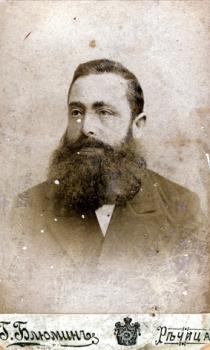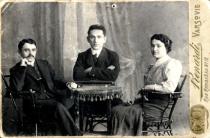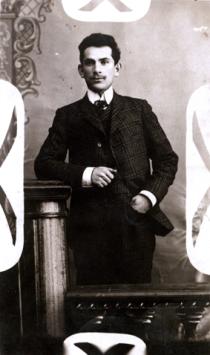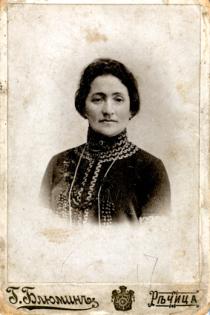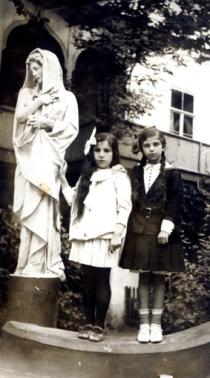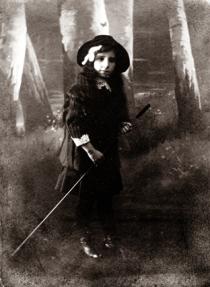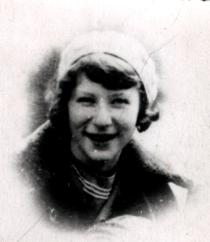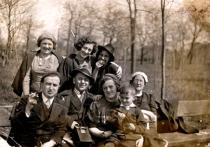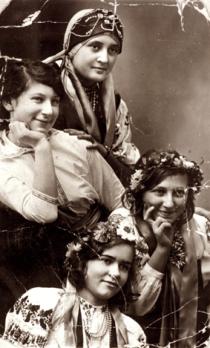
Emilia Kushnir
Kiev
Ukraine
Interviewer: Vladimir Zaidenberg
My name is Emilia Iosifovna Kushnir. My maiden name was Leibman. I was
born on December 16, 1924 in Kiev, at 3, Vladimirskaya Street, where I
lived until the beginning of WW II.
Family background
Growing up
During the War
After the War
My father, Yosif Yefimovich Leibman, was born in 1884 in the town of
Radomyshl, in the Zhitomir region. I know practically nothing about his
parents. I only know that my grandfather's name was Khaim Leibman and
grandmother's name was Surah-Milka. I don't know her maiden name.
I remember the names of my father's sisters and brothers, and I have
some information about them. Father's eldest brother, Moisey Leibman, was a
bookkeeper. Until the Revolution he lived in Warsaw, and then he worked at
a brewery in Kiev. He was killed in 1941 in Babi Yar in Kiev. (Editor's
Note: Babi Yar was the location of the first mass shooting of the Jewish
population carried out openly by the Germans on September 29-30, 1941, in
Kiev. After the war, people spoke in whispers about Jewish murders, because
according to the official version of the Soviet government, the German
Nazis killed Soviet people of different nationalities in equal numbers.
Whoever expressed another opinion risked being thrown into prison.)
My father had two sisters named Leah and Esfir who died in Moscow in
the early 1930's. I know nothing more about them. Then my father was born
and after him his sister Klara and brother Wolf. The three of them came to
Warsaw to live with their brother Moisey around 1910. They stayed there;
the brothers were working in commerce. In general, Moisey was very smart,
and he tried to teach his relatives accountancy. Then Klara and her
husband, as well as Wolf, moved to the United States, where they died in
the 1940's. The youngest sibling was father's sister Manya, who died in
Kiev early in the 1950's, and his brother Tevye, who lived in Zhitomir and
then in Moscow, where he also died.
My mother's father, Shloyme Shenderovich, came from a very large
family with many children. He had brothers named Zalman, Yakov, and Israel
(all younger than him), and sisters named Tsira Frenkel, Fanya Katsnelson,
Basya Gukhman, and Nesya Babinskaya. About them I know only that Aunt Basya
lived and died in Baku, Azerbaijan, and Aunt Nesya died in 1974 in Kiev at
the age of 90.
They all lived in Belarus and my grandfather's mother let my
grandfather run the business his father had owned. I think he was the 1st
Guild merchant. After his death, responsibility for all their large family
rested on the shoulders of my grandfather, Shloyme Shenderovich.
The name of my grandmother, my father's mother, was Dvoira
Shenderovich. I don't know her maiden name. When I was born, my
grandparents were very old. My grandfather was born around 1863, my
grandmother around 1865.
My mother, Fanya Solomonovna Shenderovich, was born in 1896 in
Belarus, in the village of Kholmichi, near Rechitsy. Today it is known as
the Gomel region. Her parents also had many children. My grandfather was
not a fanatic, but he was a religious man. In Kiev they did not have a flat
of their own, they rented a room at 11, Borisoglebskaya. I remember
grandfather praying every morning. He put on his talit and those boxes on
ropes, I forgot their names (Editor's note: tefillin). He also wore a
yarmulke. My grandmother wore an artificial braid with a black lace cap to
keep her head always covered according to the Jewish religious tradition.
My grandfather died in 1937, my grandmother in 1939.
To all his children grandfather gave a secular education. I don't know
how to explain it, but none of his children was religious. My mother had
very poor knowledge of Yiddish; she knew very little, enough only to talk
to her parents.
Now about my mother's brothers and sisters. Her eldest sister was
named Rebecca. Her husband's last name was Kagan. She graduated from a
college of dentistry. Prior to the Revolution, her husband was a doctor in
Kharkov. After the Revolution he held high offices in Kharkov's health care
system. They had three children. She died in Kharkov in the early 1950's.
My mother also had a sister named Polina, and I would like to talk
about her separately. Then there came mother's sister Tsira, whose
husband's last name was Israelit. Tsira was a teacher in Leningrad. She
died in the early 1950'-s.
Then came mother's brother Alexander, who was born in 1897. Prior to
the Revolution he finished studies at a vocational school and worked in the
supply system. He died in 1952 in Donetsk (Stalino).
The youngest brother was named Srul. He was very ill with tuberculosis
of the bones. As far as I remember, he never worked, but was constantly
ill. He died in the evacuation in 1942.
Now I would like to talk about mother's sister Polina. She was born in
1884. As I already said, grandfather taught his children secular manners
and gave them an education. Sister Polya (nickname for Polina) went into
the Revolution. First she joined the BUND party. (Editor's note: BUND,
which means "Union" in Yiddish, was a Jewish political organization created
in 1897 at the Constituent Congress of Jewish Social Democratic Groups in
Vilno. At the 1st Congress of the Russian Social-Democratic Workers' Party,
BUND joined the party as an autonomous organization, which was independent
only in questions concerning the Jewish proletariat. After some conflicts
in 1903, BUND withdrew from that party and joined the Zionist movement
"Poaley Tsion." BUND demanded that a cultural-national autonomy be created.
In March 1921, BUND decided to join the Russian Communist Party of
Bolsheviks, which led to its self-elimination.) That's what Polina told me
personally when I met her much later. From what I remember, the family
mentioned that the police were searching for her, and that she emigrated
after some case and was secretly sent to Switzerland.
When she emigrated, Polina joined various revolutionary circles which
met to discuss what the future revolution would be like. Among the members
were many emigrants from Russia. The main one was Plekhanov. (Editor's
note: Georgy Plekhanov, 1856-1918, was a Russian theoretician and
propagandist of Marxism, and an activist in the Russian and international
workers' movement. They addressed him for any issues, but he was very
arrogant, behaving like a royal, and believed everyone should act on
his/her own.) Polina also met Martov (Editor's note: Martov's real name was
Yuliy Tsederbaum, 1879-1923, a Russian Social Democrat, and one of the
Mensheviks' leaders). She also met Akselrod, and I think she was a friend
of his sisters. (Editor's note: Pavel Akselrod, 1850-1928, was one of the
Mensheviks' leaders who emigrated after the October Revolution. He
propagated reforms, stood against the Soviet power, and even called for
military intervention.) In those circles she also met Lenin. (Editor's
note: Vladimir Lenin, 1870-1924, whose real name was Vladimir Ulyanov, was a proletarian
revolutionary, organizer of the Communist Party of the Soviet Union, and
founder of the Soviet Union). In their midst they called him an "iron
head," because they believed he always knew what he wanted. When he was
leaving for Russia, all the emigrants went to see him off at the train
station. He was late. Finally, he showed up - he had been shopping, looking
for a cheap cap.
Later, in 1912, Lenin and Krupskaya lived in Poland. (Editor's note:
Lenin's wife, Nadezhda Krupskaya, 1869-1939, was a participant in the
revolutionary movement, a Soviet state and party figure, and one of
creators of the Soviet system of people's education.) Krupskaya had
Basedow's disease and needed surgery. Meanwhile, in Switzerland there was a
famous Professor Kokhe, in whose clinic my Aunt Polina was then working.
So, somebody introduced her to Lenin and asked her to arrange a free
operation for Krupskaya. The professor performed this operation free of
charge, and in gratitude Lenin brought a box of candies and a bouquet of
red roses to my aunt.
At first, my aunt's life in Switzerland was very hard; even my
grandfather helped her. Then she graduated from a university, became an
oculist and withdrew from revolutionary activities. She was very concerned,
because being an immigrant she had no right to work in Switzerland, so she
was planning to go to Australia. But then she suddenly met her future
husband, who was an Italian Swiss; his last name was Rusko. She became very
rich. They lived in Lokarno and she had her own clinic. Then for many years
she was an activist in the Red Cross organization. Once, when fascists came
to power in Germany, even a Soviet ambassador turned to her, asking to tell
him about good places for recreation in Switzerland, where the Soviets
could send their leaders for a rest. They used to send them to Germany, but
they no longer could afford that.
After the Revolution, from what I remember, Aunt Polina tried to help
my grandparents survive. They lived a pretty good lifestyle with the money
she sent them from Switzerland. They could even help us sometimes. On
Hannukah they gave good gifts to all the children; my cousin who lived in
Kiev even got a violoncello. In summer they always went to a dacha in
Puscha-Voditsy or Vorzel - they could afford it due to my aunt's help.
In 1924, my aunt came to the USSR. Despite the fact that all
diplomatic relations with Switzerland were broken because of the murder of
Voikov. (Editor's note: Peter Voikov, 1888-1927, was an active participant
in the revolutionary movement in Russia, and a Soviet diplomat. He was
killed by a Russian White Guard officer.) Aunt Polina used her old
connections with the German Communists and received permission to come here
for a ten-day visit. She saw all of her relatives here. She left with a
heavy heart after having seen her old and exhausted parents. Before that,
in Switzerland, she had worried very much that she would not be allowed to
leave from here again.
After that she regularly sent money in foreign currency to my
grandparents through the bank. It became even better when in 1932 a special
trade system opened where food and clothes could be bought for foreign
currency and gold, because there was famine in those days which lasted
until 1938. My grandfather had already died. Then Aunt Polina sent clothes
and fabric through some company in Estonia or Latvia. Then communication
with her was interrupted for many years.
After finishing gymnasium (secondary school) during WW I, my mother
worked in a hospital. Then she gained admission to the University medical
school, but did not complete her studies. She was already in Kiev, but I
don't know how they got to Kiev. I know she married in Kiev, gave birth to
me and had complications - hearing problems. So after that she no longer
studied or worked outside the home, but was a housewife.
My childhood was one typical of all Soviet children - kindergarten,
school and war.
I went to school in 1931. It was a regular Russian school. It replaced our
former Jewish school at 5, Vladimirskaya Street (one of the central streets
of Kiev), near our house. Until 1935, there was a Jewish school next to
us, then it was closed, and its director became director of our school for
some time. I don't know why that school was closed. You see, we were all
internationalists; we did not care who was Russian, Jewish or Ukrainian.
Our school was mixed - boys and girls studied together. There were Jewish
children in our class, but no one cared. There was, however, a Russian
family in our house. People were forbidden to celebrate New Year's or
decorate New Year trees (In the Soviet Union, people never celebrated
Christmas, but rather New Year's on January 1, hence people had "New Year
trees" instead of "Christmas trees"). I don't remember what year it was
when Postyshev allowed people to celebrate the New Year. (Editor's note:
Pavel Postyshev, 1887-1939, was a Soviet Communist Party activist). So,
this family invited me to celebrate either New Year or Christmas with them.
And the rest of our neighbors were surprised that they would invite me, a
Jew.
My best friends were Russians. We are still in very good relationships
with them. I certainly could understand Yiddish a little because I often
visited with my grandparents. I remember Jewish holidays well: Passover and
Rosh Hashana. We would go to Podol, to my grandparents, where we sat around
the table eating stuffed fish and chicken soup and drinking grape wine.
They baked matzoh at home. After grandfather's death, grandmother did not
go to synagogue, but to a private prayer house next to her house. And after
her death, traditions were no longer kept. We only visited father's elder
brother, who still kept the traditions.
I had a good time at school. I was a Young Pioneer, then a Komsomol
member. I was a Pioneer Leader, taking care of younger children. We
organized all kinds of activities, had an amateur theater, sang, danced,
etc.. Life was bubbling.
I had no religious friends, only atheists. I remember how churches
were destroyed. There was the Desyatinnaya Church across from my house. We
all were warned that it would be blown up; all the windows were sealed up
with paper. It was blown up in 1936, and all of us adults believed that
this was normal. Excavations were held there later and an ancient cemetery
was found. Then a historical museum was built on that site. I also remember
how St. Michael's Cathedral was blown up.
In the 1930's I remember that some people were arrested, including my
maternal uncle, Alexander Shenderovich, born in 1897, who was arrested as a
White Guard officer. I don't know exactly whether he really was in the
White Army, maybe during the Civil War. I don't know why, but when my aunt
was allowed to visit him in prison, she took me with her. I remember how he
was led out to us and we could visit with him. Soon afterwards he was
released and I remember how he came home with a tiny bag.
I remember how the father of one girl was arrested. He worked in
Soviet People's Committee. Then another girl's father, a military man, was
also arrested, but these girls continued to study at our class. We treated
them well, saying that their fathers were enemies of the nation. But people
did not have real hatred against such people because secretly nobody
believed they were "enemies of the nation."
Even though my friends and I were not interested in politics, we
certainly knew about Hitler and "Crystal Night." There was information on
it in the press. We went to watch movies like "Professor Mamlok" and
"Oppenhaim Family".
Nobody paid any special attention to this at school. We were
constantly preparing for a war. I remember the Finnish War a little, in
1940, when we had to stand in lines for food. It was hard, cold and long.
And then the Ribbentrop-Molotov Pact was signed. We believed it was for the
good, so that there would be no war. In general we did not think much about
it. We were confident that the Germans would be stopped immediately at the
border. We even sang songs to this effect. The breakup of the war found me
in Kharkov, where I was visiting my aunt. I remember we received a phone
call and were told to turn on the radio at 12 o'clock. Our radio was a big
black plate. So, we turned it on and heard Molotov's address to the nation.
My uncle was very anxious because his son was serving in Izmail (in the
Odessa region of Ukraine), and combat actions were already underway there.
To be honest, we immediately ran to the savings bank to get our money, but
restrictions had already been put on the giving out of money. I stayed in
Kharkov until early July. Kharkov was not bombed yet, while Kiev was bombed
all the time. My uncle often called us and said, "We are coming soon."
Then we began to see many evacuated residents of Western Ukraine. I
remember my cousin with her child came to Kharkov and told us that many
people were moving out of Kiev. My uncle tried to tell us the same thing on
the phone but secretly, saying that he and his family wanted to come and
see us. Otherwise he could have been accused of spreading panic.
My mother and her two brothers left Kiev for Kharkov, but they went
on a raft across Dneper and got to Dnepropetrovsk. There was my uncle's
organization, which was evacuating some cranes, metal constructions, etc.
They all were put on an open platform and sent to Sverdlovsk. It happened
so that they were passing by Kharkov, and they asked somebody to go and get
me. So, I joined them and we went to Sverdlovsk together. The journey took
twenty days.
We were in a tall, roofless train car. There were a lot of metal
constructions on the floor, and a tent stood upon them. That's where we
stayed. My uncle had a paper that said that we were in charge of the cargo.
That's how my mother and I were reunited.
My father remained in Kiev. He had to turn over his duties. In
general, there was no special Jewish evacuation. Enterprises and
organizations were evacuated, but nobody was going to evacuate the Jews.
There were people who did not believe Germans would kill the Jews. A family
from our house stayed in Kiev. They believed nobody would touch them. They
died in Babi Yar. My uncle, Moisey Leibman, was also killed there. His
former wife and older daughter came to visit him from Korosten. All three
of them died in Babi Yar - it was too late for them to evacuate.
Right before our departure from Kharkov we went to a theater
performance. During the war Michoelse's theater came there, and we watched
"The Wandering Stars."
When we came to Sverdlovsk we were not received there but sent
further on. Thus we found ourselves in a village 12 kilometers from
Krasnoufimsk. We had my mother's cousin, Nadezhda Babinskaya, with us. She
was a violinist at the Kiev Jewish Theater. Her daughter, a conservatory
student and a violoncellist, was also there. For both of them life was very
hard as they were not used to hard manual labor. At the collective farm we
were ordered to do the heaviest work possible. In general, all women worked
that way, but we came from a city and we were not used to such work.
My mother and I were settled at one house, my aunt and cousin at
another. My mother and I slept in one bed. I remember well that we had a
samovar and drank tea all the time - without sugar, and practically without
tea enough for one brew, but we could drink ten glasses of that. People
also had lice, excuse me. There was a special comb to comb them out. I also
had lice for some time.
In general, our landlords used the word "kike" all the time. But when
we told them we were "kikes", they did not believe us. They said, "No, how
can you be kikes? All kikes are red!"
My father first went to Chelyabinsk and then to Sverdlovsk. There he
found a job at the Urals Gold Trust Company; it was in a district full of
gold and platinum. Later he took my mother and me from that village, and we
lived in the village at the gold field, 250 km from Sverdlovsk. In the
beginning it was very hard. We had no food but bread purchased with bread
cards. There was a canteen, but only workers of that company were allowed
to eat there. So, my father would go first to the canteen (he had a pass),
and if the waitress was kind, she would leave his pass untouched, then I
had a chance to use the same pass, then my mother. But if they marked the
pass, my mother and I remained hungry.
In Sverdlovsk I went to school. There were three evacuated girls in
my class: one from Leningrad, one from Moscow, and me. Two of us were
Jewish, one was Russian. The father of the girl from Leningrad was chief of
the Diamond Party and they lived well. But we received skimpy soup and a
tiny roll (for cards). Once we learned that nobody ate that soup, so we
brought cans and took all the remaining soup home. We ate it all, but our
classmates misunderstood us; there was even an article in the paper that we
took all the soup left in the school. We stayed with another family. They
had food, flour, potatoes. So, their small children would open our doors
and shout: "Our mother is cooking ravioli today! And we won't give you
any!" We remembered this for a long time. My father was given potatoes,
which we baked, boiled, and fried.
Then life became better. A gold-digging artel (Editor's note: a
workers' cooperative, probably a state-owned company) was set up, and my
father received sugar and even oil. Then I finished school and started work
at the local kindergarten. Later, I attended Sverdlovsk University. Later,
my father found a job in Sverdlovsk, and while I lived in a dormitory, my
parents rented a part of a room.
We returned from evacuation in 1945. We wanted to go to Kiev, but
could not get there. Our uncle helped us go to Donetsk. Then I went to Kiev
to study at the Institute, but we could not get our flat back, so we had to
move to Lvov. A military tribunal prosecutor lived in our flat, and since
my father did not serve in the army because of his age, we were not allowed
to receive our flat back. He turned to the chairman of the city council for
help, but received none, so we had to go to Lvov. There we bribed the house-
manager (which was "unofficially legal") and bought a good flat from the
Poles. Many Poles were leaving for Poland at that time, for they did not
want to stay "with the Soviets." They were offered Ukrainian citizenship,
but they did not want it and almost all of them left. They did not call us
"Jewish" or "Russian", but only "Soviet." In general, they remembered how
good their life was "with the Poles." I also remember being in fear of
Bandera gangs. There I began to work at the printing shop and to study at
the Lvov Polygraphist Institute. Then we exchanged our good flat in Lvov
for a bad flat in Kiev and moved to Kiev.
I began to work at the "Radyanska Ukraina" ("Soviet Ukraine")
publishers. There I worked for the rest of my life, first as a labor
management engineer, then as the chief of the labor department, and then I
retired. I could not continue to work on my career. But I had been working
at the ideology department, which was very rare for Jews. After the war I
sensed a difference in attitude towards the Jews. I was no longer promoted
anywhere because I was Jewish.
I remember the year 1953 mostly due to Stalin's death. People in
general were very loyal to him, and our family was, too. I was hysterical
when I heard he died. It was a shock for the country to listen to the 20th
Party Congress with Khrushchev exposing Stalin's cult. Not everyone
believed that, many remained Stalin's admirers. (editor's note: the
proceedings of this Congress were secret. It is unlikely, but not
impossible, that the Interviewee knewof them at the time).
I married in 1955. My husband, Boris Markovich Kushnir, is Jewish. He
was born in 1924, in the village of Gaisin, in the Vinnitsa region. He
fought during the war as a private, and the end of the war found him
somewhere under Kenningsberg. Unfortunately, I know nothing about his
grandparents, only that they were Jewish. Boris, just like me, was brought
up in a Jewish family and received a good education. But his family never
were religious, so neither my husband nor I know Jewish traditions,
religion or language. We lived at a time when it was not very safe or
fashionable to be religious and attend a church or a synagogue.
Boris graduated from the Economic Institute of Kiev. He felt anti-
Semitism very strongly. He worked as an economist, but Jews were not
allowed such jobs. It took him a while to find a job at the art glass
factory, but then he was fired from there. He had a conflict with somebody;
anyway, he was fired because he was Jewish. Then for a very long time he
could find no job. Some of his friends - Russians, and Ukrainians with whom
he had studied, worked at the People's Economy Council and provided
recommendations for him. He went to many places, was told that people of
his profession were needed, but as soon as he showed his documents, he was
immediately denied any job offers. Explanations varied: we don't need you
anymore, etc., but nobody stated the direct reason. Then the
"Yuzhgiprosteklo" Institute was set up, he was admitted there, and he
worked there up till his retirement to pension.
I also felt anti-Semitism in my life. Jews were not given work at our
organization, but those Jews who were already working there were not
dismissed. When I was sent to work by the institute in 1949, the director
of that work was Nathan Kaplan, a very good man, active and famous. And
then the Central Committee of the Communist Party dismissed him for no
reason, allegedly for confusing two pages in a newspaper, even though he
had nothing to do with that. It was a real tragedy for our collective. Then
we had a Party meeting, at which we all had to vote for his dismissal, but
nobody wanted to vote for that, on the contrary, we wanted to get him back.
Well, it did not help, and organizers of that "rebellion" were also
accused.
In 1955 my aunt Polya came to us from Switzerland. I already mentioned
that we lost communication with her prior to the war. After the war, my
father found her. She said her husband had died. Our correspondence was
restored. Then again in 1949 there was fight against cosmopolitism, and
again we had no letters from her. Only after Stalin's death, a friend of
hers (whose son was a political figure in democratic Germany) came to us
and brought us a letter from her.
So, when we received a letter from her, telling us that she was
coming, my father went to the police to "legalize," so to speak, her visit.
He went and asked them if we could have a relative visit us from
Switzerland. The police said "yes," so, we went to the airport. My father
went to ask some boss whether we could meet her on the field. Again, the
answer was "yes," so we bought flowers, even though it was uncommon then.
We took my aunt and her son to the "Intourist" hotel. My husband and I went
to invite them to come over. They wanted to walk along Kreschatik. We went
to Ulyanovy Street. There, next to our house there was a terrible house,
with a toilet outside. My cousin, Aunt Polya's son, wanted to record this
house on video. My husband did not go with him. He said, "I don't want to
leave a trace in such affairs." My mother cooked a wonderful dinner and
invited everyone who knew my aunt. My husband noticed that outside our
house a car was being repaired for the whole time they spent at our house.
As soon as they left, the car left too.
Then they went to Moscow. We saw them off at the train station, and
they were watched again. After their departure, the police came to my
mother and to my workplace. My husband was also summoned to the personnel
department of his workplace and asked many detailed questions about our
guests and those who wanted to see them here. They tried to make him a
supergrass, but he declined the "offer."
When aunt Polya was in Moscow, no relatives or friends who lived there
were brave enough to see her. Only her cousin came to see her from
Leningrad.
My mother died in 1963. After that, Aunt Polya invited me to
Switzerland many times, and I went to visit her in 1967, 1972, 1974, and
1977. And in 1988 I visited cousin Franklin, when my aunt was no longer
alive.
We talked a lot with her. For her whole life she was an atheist. But
at the end of her life she was interested in this question. She told me
many times, "You know, nobody came back from there." At the end of her
life, when I would go for a walk with her, she would often go to the
Catholic Church. She would only come inside, stand for a while and leave.
Her husband and her daughter were atheists, but her son Franklin read a lot
about different religions and chose to become a Catholic. He is a Catholic
now, not a fanatic, but once a week he goes to mass.
When I visited them for the first time in 1967, they told me they knew
about everything that was going on in our country and were against it. She
asked me, "What did you kill Trotsky for?" (Editor's note: Trotsky (Leo
Bronstein, 1879-1940, creator of the ideological-political movement which
was antagonistic to Marxism and close to the Mensheviks. It was called
"Trotskyism." For "anti-Soviet" propaganda, Trotsky was sent outside of the
USSR in 1929 and deprived of Soviet citizenship in 1932. He was killed in
Mexico by Communist Ramon Merkader). I personally never knew he was killed;
nobody here knew that fact. "But Stalin killed him!" Aunt Polya said. They
said that in general the idea of Communism is not bad, but any idea can
exist for 20 years, while in our country the Soviet power was 50 years old,
but everyone in the leadership was thinking only about their own good. They
told me all these things, but I was, and am, a Soviet.
When the new political developments and wars started in Israel, my
father got very interested in them. He took all Jewish problems very
closely to heart. He subscribed to the Soviet Jewish journal and listened
to all the "Voices" (radio stations that were forbidden in our country and
whose radiocast was jammed); he wanted to know the truth. My father died in
1974.
For some time my husband and I were thinking of emigrating to Israel.
We knew very little of Israel then and were afraid to quit everything here
and find ourselves in a strange and unknown country. We thought we would
never again be able to return here and see our near and dear, for everyone
who left could not even keep up a correspondence with us because of our
fear of the authorities. Such correspondence was always checked by the
Security Service and it was dangerous; people could even be fired from work
for it. We also understood that it would be hard for us to learn a new
language and find a job. At that time those who were emigrating were held
up to shame. Then we decided that since we were alone, with no children, we
could stay here; and so we stayed.
Later, after my husband's death, I went to Israel. My cousin Franklin
paid for my trip. I certainly took everything there as something dear and
close. Everything was so interesting - the rich synagogues, the Torah
scrolls, the mezuzahs. I was there on Passover. I heard the words I had
forgotten long time ago, the words I knew in my childhood. Some things I
recovered in my memory, others things were new to me.
In Israel I learned about all the traditions, about how to celebrate
Passover, about prayers and Haggadah. Jewish life in Kiev is very
different. It is wonderful that we have "Hesed," synagogues and Jewish
youth organizations. I certainly don't want to pretend, because I am not
religious and will never be, but I am still very interested in everything
about Jewish life. Sometimes I think that we have lost something in our
lives due to the degree of our assimilation and being far from the Jewish
life. But it is not our fault - it is rather our trouble. That is why I am
really happy about the restoration of Jewish life. Even Russians and
Ukrainians are jealous, saying that the Jews are doing a good job, thinking
about one another, for the whole world is helping our Jews to survive and
to identify themselves with the Jewish nation. That is why it is so nice
that young people have plunged so deeply into the Jewish life, into various
Jewish organizations. They will not miss what being Jewish is all about.
I am very grateful to you for talking to me. I hope it will be
helpful. Thank you.
